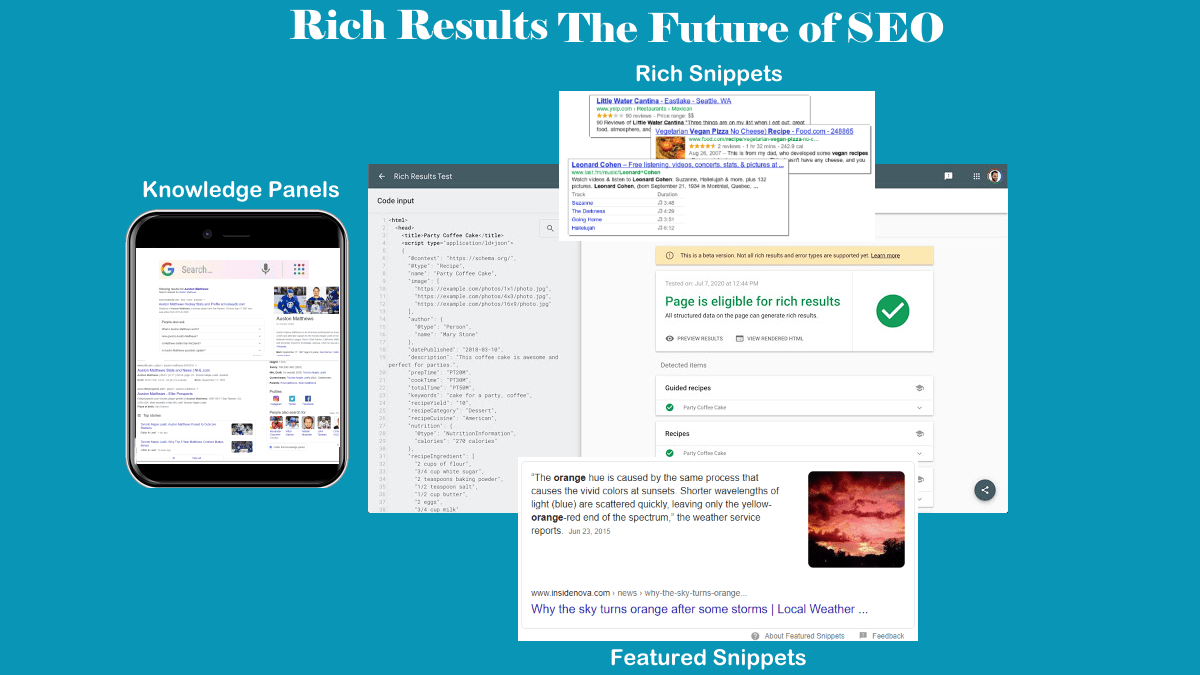What is a Google Rich Result?
A rich result is any result that isn’t a traditional “blue link”. Examples of rich results are reviews and ratings, prices, events, howto results and more implemented with schema and known as rich snippets. Answer boxes, knowledge panels which come from the knowledge graph. Universal Search results are also rich results including local search packs, shopping results, images, news and video results.
Rich Results the Future of SEO!
Google defines Rich Results as: Experiences on Google surfaces that go beyond the standard blue link.
Googles definition is important because “Google surfaces” includes voice search and voice assistants which are the future of optimizing content for search! Don’t fear but rather embrace rich results in your SEO because a lot of the research that search engines are currently focused on is in understanding the content of the page using NLP (Natural Language Processing) for the purpose of extracting information and answers for knowledge graphs.
The intent of users searching on devices **other than desktop** is often for specific information to perform a task and rich results like featured snippets, knowledge panels, and schema provide the best way to provide/display those kinds of results. The huge bonus for search engines is they are able to provide the answer right at the top of the SERP and keep the user on site. That is the primary reason I believe it is the future of the trade!
The days of “phrase matching” and links alone to determine relevance is for the most part dead. Phrase matching still plays a big role in ranking “passages”, however, at the page level relevance and therefore onpage optimization is less about phrase matching and more about the entities, entity associations and topic/concepts in the query corpus (all pages containing the words in the query).
History of Rich Results
The first rich result that I remember is the sitelink which was added because the query is navigational and sitelinks provided deeper links to areas of the site Google’s algorithm indicated would be of interest to users.
The next rich result was the addition of video and realizing that many queries were hybrid meaning the intent of the user could be met by several elements Universal or Blended Search which started adding rich results for news, shopping, local search, images and video.
As Google search moved toward entity based search the Knowledge Panel rich result implementing the knowledge graph repository appeared in the SERP further improving the in-SERP information about people, organizations, places and things.
As Google developed their ability to extract entity information using their web tables and tabbed data methods featured snippets were added to the SERP in position 0. Featured Snippets are the most difficult rich result to produce because they are often for specific information which if incorrect can have a negative impact on searchers.
As Google went further down the road to full on “entity search” they implemented structured data, in particular schema markup, has become a primary method of extracting rich snippets for displaying specific information like product and service prices and offers, reviews/ratings, events and more.
SEO Considerations for all Rich Results
- Technical SEO concerns are:
- Google requirements for structured data types you have used in the page/website
- Testing your page for rich results support should be a part of your pre-publish checklist.
- Monitoring Google Search Console for errors in structured data, logos and breadcrumbs.
- For content writers the rich result challenge is:
- identifying the questions and topics associated with a query.
- writing content that has clear and concise answers.
- identifying 3rd party knowledge panel cited sources.
- writing content that that meets searcher’s immediate needs.
How to Get Rich Results in SERPs
To get some types of rich results is as easy as going to GoogleMYBusiness and creating a listing which should result in a knowledge panel. For rich snippets it’s as simple as properly implementing schema and meeting all Google requirements for the type of schema you are adding to the page. Featured snippets are more complicated as they are extracted from ranking pages which does get position zero in the SERP but that comes with losing the organic result.
That isn’t all there is to it but as far as getting a Knowledge Panel in the SERP that’s about it. Your GMB listing is also part of optimizing for Local Search Paks for Google Maps. Search Paks are often at or near the top of the SERP so optimizing the GMB listing is an important part of
Not all rich results require structured data, however, HTML elements or punctuation that creates Key|Value pairs that optimize extraction of information are still required. For instance First Name: Terry creates a key value pair for my first name. Over the years Google has used punctuation as a delimiter for a few things. Hyphen (-) is used in URLs and Google have also supported underscores ( _ ). Underscore lost favor quickly with webmasters because underscores weren’t legible when URLs were underlined. IMO, the best delimiter for this purpose is colon for single key/value pairs. for multiple values to a single key an HTML table would be ideal.

